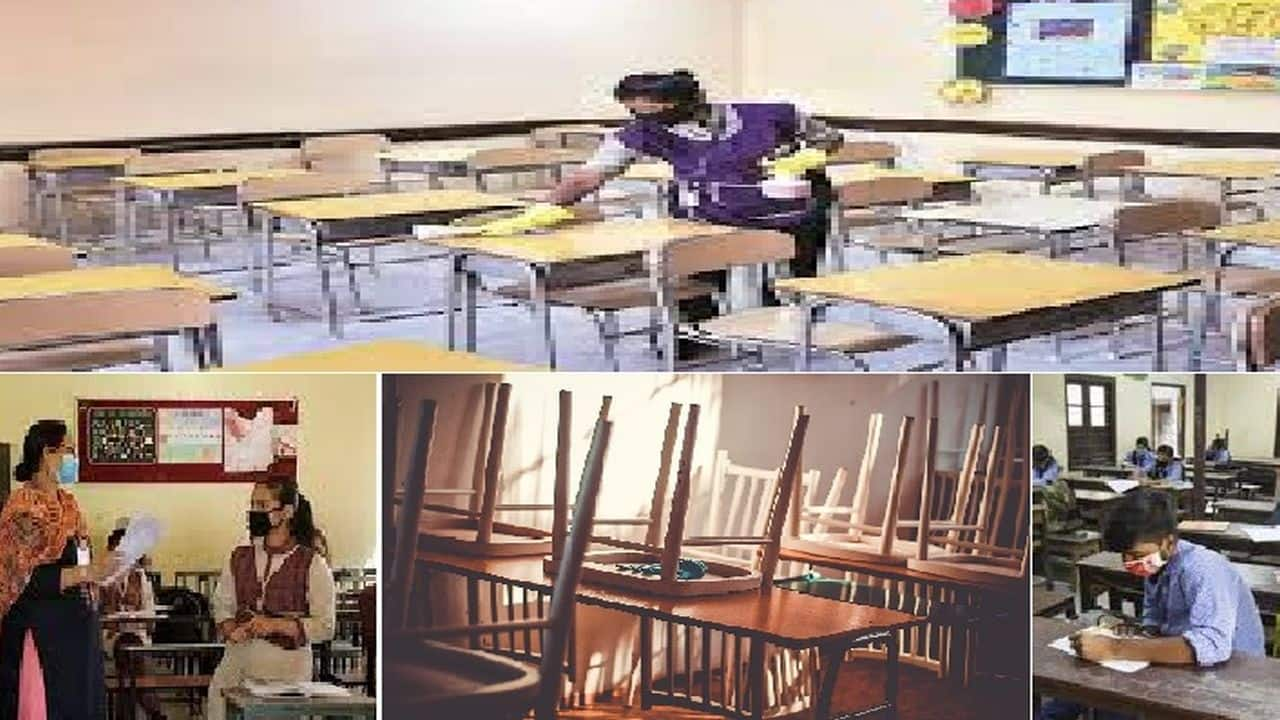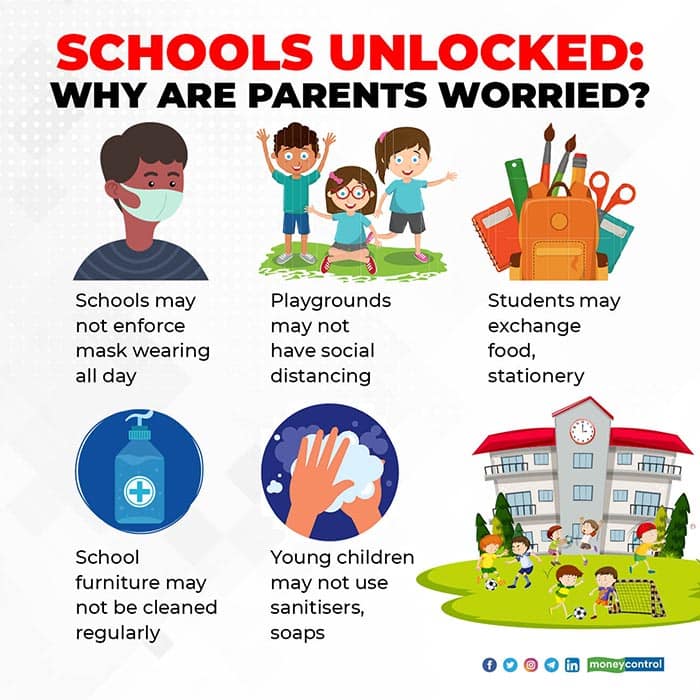



Harish Bhatia was all set to send his 14-year-old son back to school after almost eight months of lockdown and online classes but then the dry fruit trader in Haryana's Ambala decided against giving the consent note that Kushal needed to join the school. His older son Satish had tested positive for the coronavirus three days after the 20-year-old reached his engineering college in Chennai in Tamil Nadu.
“I am worried whether Satish contracted COVID-19 in Haryana or Chennai. If he contracted it here, then we are also at risk. How do I send my younger son to school in this situation?” the 45-year-old told Moneycontrol over the phone.
This is the question that is haunting parents from Haryana to Tamil Nadu and from Arunachal Pradesh to Maharashtra as states allow classes to resume in schools, beginning with senior students. WhatsApp groups are buzzing as worried parents wonder if schools are safe.
In the last few weeks, India has seen a drop in the known coronavirus infections but with 10.1 million cases, it still has the second-highest COVID-19 load in the world after the United States.
Schools have been at the centre of a fierce debate across the world, splitting scientists and governments. Some have favoured teaching to continue in schools, saying younger children were not as vulnerable to the virus. In many countries, including India, schools were shut when the lockdown was announced.
Classes were moved online but a large section of students was left out. Internet connectivity remains dodgy in several parts of the country, while smartphones and laptops are still a luxury for a sizable part of India’s population.
Classroom callingStudents of classes 9-12 are being encouraged to return but the fear of coronavirus coupled with low confidence in hygiene standards is seeing parents keep their children away for now.
Sreebhama Bhat, who lives in Bellary in Karnataka, is not ready to send her 13-year-old daughter Piyali to school. The school was not equipped to handle social distancing or enforce masks, the 39-year-old said.
“The school has a large football ground which can accommodate up to 500 children. When I had a chat with the school management, I was told that ‘there could be risks’, though they assured us that the staff will ensure masks are worn at all times. How can I be sure that Piyali won’t take off her mask and will maintain social distancing,” Bhat said.
 Schools have reopened, with students of senior classes being asked to rejoin.
Schools have reopened, with students of senior classes being asked to rejoin.For the last few days, the only discussion Bhat and others have had on a WhatsApp parents group set up by the school is whether it was safe to send children back to school from January 1.
So far, parents of only three students in a class of 50 had agreed to send their children to school, she said. A consent note for parents is mandatory for children to rejoin school.
Back to schoolArunachal Pradesh, Meghalaya, Nagaland (partial reopening), Haryana, Bihar, Jharkhand, Uttar Pradesh, Uttarakhand and Andhra Pradesh reopened schools from November. Punjab did it a month earlier.
Assam, Kerala and Karnataka will open schools from January 1, and it is the senior students—Classes 9 to 12—who go in first. For Classes 1-8, if half of the students or more agree to come back, schools will begin physical classes.
Maharashtra and Tamil Nadu, which reported one of the highest numbers of coronavirus cases in the country, along with Rajasthan, Telangana and West Bengal are undecided on when to open schools.
Though governments have given the go-ahead, not all schools have resumed classes. A consensus is being sought from teachers, school boards and staff on the preparedness for classes and the underlying risks and liabilities.
Seema Chawla, the vice-principal of New Blossom High School in Punjab’s Gurdaspur, said they decided against resuming classes.
“If a student contracts COVID-19, imagine the liabilities we will face,” Chawla said. Parents visited the classrooms and decided against sending in the children. “So, we decided to stay closed. If students don’t turn up, what is the use of us reopening school?” she said.

States like Haryana and Andhra Pradesh saw a spike in coronavirus cases after schools reopened. In Andhra, for instance, within two weeks of reopening of schools on November 2, 575 students and 829 teachers tested positive.
In Haryana, more than 150 students were infected after schools reopened in the first week of November, forcing the government to again shut schools from November 20 to December 10.
What is worrying parents?The biggest concern is to ensure that children wear masks, keep the distance and not share books or food. And, most parents think that schools can’t monitor all the students all of the time.
While schools say they will ensure masks are worn in the classrooms, lunch breaks, toilet visits and playgrounds remain a concern.
Schools were saying that students won’t be allowed in the playgrounds due to COVID-19 but would this be enforced, Kolkata’s Nisha Cherian said.
“I find it tough to handle my 12-year-old son who now plays in our building corridor since we don’t allow him to go to the public ground. His school has 900 students. How will social distancing be maintained,” Cherian said.
 Attendance remains thin across schools as coronavirus fears keep students away.
Attendance remains thin across schools as coronavirus fears keep students away.She added that the odd-even scheme (based on roll numbers) for attending school may not work because parents won’t agree. After initial days, schools could lower their guard and it could lead to infections, she said.
Bengaluru’s Lavanya Sridhar who got infected in August was firm that her 16-year-old son Pranay would go back to school only after all his 39 classmates present a COVID-19 negative certificate.
“How can I be sure that other students in the class don’t have COVID-19? I took all precautions but still contracted COVID-19. Pranay is giving the Class 10 board examination next year, so we can’t take any risks,” she said.
Some parents like Kartika Pillai in Andhra's Kadapa decided to go back to online classes after experimenting with physical classes for a week.
 Staff disinfecting a classroom in a Delhi school.
Staff disinfecting a classroom in a Delhi school.Pillai saw her 15-year-old son Praveen step out of the school without a mask every day. His school even allowed a food vendor inside, she said.
"What care is the school taking if he is not wearing a mask? He may not be wearing it even inside the school since he was eating at a 'chaat' vendor... It is not worth the risk, so I informed the school that we will opt for online classes," she said.
Then who is going to school?In states like Arunachal Pradesh and Andhra, about 30 percent of children are back in school, initial estimates show.
Tina Nabam, a 37-year-old single mother from Arunchal’s Dibang Valley area, told Moneycontrol she decided to send her 14-year-old daughter to school because internet connectivity was poor at home.
“I was using the same laptop for my consulting work as Misha. She was hardly able to learn anything because internet connectivity is very poor here. I know there are risks but in school, she is at least able to study properly,” Nabam said.
Misha has been strictly told not to remove her mask except during lunchtime or to drink water. It has been two weeks and Misha hasn’t faced any major issues.
But Nabam knows the risks too well. Their neighbour tested positive in the first week of December and Misha used to frequent the house to play.
"In my daughter's class, only five to six students (out of 35) turn up every day. I know all it takes is one droplet for COVID-19 to spread, but what do I do?" she said.
Mumbai’s Kapil Desai, who owns a grocery store, plans to send his son Akhil, a Class 8 student, back to school the day it opens.
“Safety and hygiene are important but so is the child’s future. We don’t have a laptop at home, so he completely missed out on all the online lessons,” Desai said. He had fallen behind, while all his friends were attending classes regularly. “I have no other option but to send him to school even though I know they wouldn’t take care of hygiene and sanitation as well as we do at home,” he said.
For Desai, Nabam and many others, lack of infrastructure at home is the only reason to send their children back to school. Given a choice, they, too, would prefer online schooling.
Discover the latest Business News, Sensex, and Nifty updates. Obtain Personal Finance insights, tax queries, and expert opinions on Moneycontrol or download the Moneycontrol App to stay updated!
Find the best of Al News in one place, specially curated for you every weekend.
Stay on top of the latest tech trends and biggest startup news.